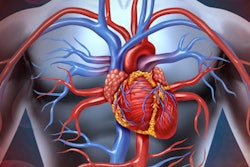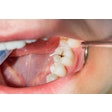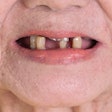
Does periodontal treatment improve the overall health of people with diabetes? A new study examined the effects of periodontal interventions on cardiovascular disease (CVD) in patients with periodontitis and type 2 diabetes, and found that some therapeutic treatments may reduce the risk of cardiovascular complications.
Researchers conducted a retrospective study of more than 15,000 patients to determine if undergoing subgingival curettage or flap operations influenced the occurrence of cardiovascular disease, including myocardial infarction, heart failure, and stroke, in patients with periodontitis and type 2 diabetes (Internal Medicine, May 1, 2017, Vol. 56:9, pp. 1015-1021).
"Advanced periodontal therapy lowers the rate of CVD, especially myocardial infarction and heart failure," wrote lead author Chiung-Huei Peng, DDS, PhD, of Hungkuang University in Taiwan and colleagues. "Dental management has a beneficial effect on the health of patients with type 2 diabetes."
Benefits are wide-ranging
Periodontal disease may predispose individuals to cardiovascular disease, and diabetes increases the risk of death from CVD. But it remains unclear whether periodontal treatment reduces the risk of CVD in patients with diabetes.
Diabetes is a risk factor for periodontitis, with rates of periodontal disease two to three times higher in individuals with diabetes, especially those with inadequate glycemic control, the authors noted. Previous research has shown that individuals with diabetes and severe periodontitis have greater intimal-medial wall thickness, acoustic shadowing, and a higher incidence of coronary artery disease compared with those without diabetes or periodontal disease. Intimal-medial wall thickness is used to detect the presence of atherosclerotic disease.
“Periodontal therapeutic intervention may help to reduce the risk of cardiovascular complications in diabetes patients.”
Given these connections, the authors wanted to know if periodontal treatment could influence the incidence of CVD in individuals with type 2 diabetes. They examined data from the Taiwan National Health Insurance (NHI) program, in which nearly all residents of Taiwan are enrolled.
They considered data for adults with the following medical history:
- Diagnosis of type 2 diabetes in 1999 through 2001
- Diagnosis of periodontitis
- Outpatient periodontal treatment in the three years following the diabetes diagnosis
- Not previously diagnosed with CVD
The researchers only included patients who underwent at least three periodontal treatments in order to eliminate unnecessary entries. All treatment costs were covered by the NHI.
They assigned participants to an advanced or nonadvanced periodontal treatment group based on the most severe periodontal treatment they had undergone. Subgingival curettage and flap operations were defined as advanced periodontal treatments.
This resulted in 3,039 patients in the advanced treatment group. The researchers used propensity-score matching to match four patients in the nonadvanced group to each patient in the advanced group based on age, gender, comorbidities, hypoglycemic agents used, and stains used, producing a nonadvanced group of 12,156 patients.
All patients were followed until the onset of CVD or December 31, 2011. After matching, no differences remained in age or gender, but there were differences with respect to medications (such as sulfonylurea, thiazolidinediones, and dipeptidyl peptidase 4 inhibitors) and comorbidities (such as chronic liver disease and chronic obstructive pulmonary disease).
After adjusting for confounding variables, the researchers found that undergoing advanced periodontal treatment versus nonadvanced treatment did not significantly affect the incidence of CVD. However, the incidences of myocardial infarction and heart failure, which are major components of CVD, were each significantly lower in the advanced treatment group compared with the nonadvanced treatment group. The incidence of stroke was not affected.
| Incidence of CVD in diabetic patients with periodontal treatment | |||||
| Condition | Advanced treatment (incidence per 100 person years) | Nonadvanced treatment (incidence per 100 person years) | |||
| CVD | 7.24 | 7.81 | |||
| Myocardial infarction | 3.32 | 3.67 | |||
| Stroke | 1.41 | 1.55 | |||
| Heart failure | 0.18 | 0.32 | |||
"Our analysis revealed that advanced periodontal treatment effectively alleviated the incidence of myocardial infarction and heart failure (the latter to a greater extent), whereas it had no significant effect on stroke," the authors wrote. "These results indicate there might be some discrepancies between the pathogenesis of stroke and periodontitis-associated coronary artery disease."
Periodontal treatment recommended
The researchers noted some limitations of the study:
- It was retrospective and not randomized.
- The NHI Research Database is primarily maintained for reimbursement, so only the periodontitis code but no information on the actual periodontal condition could be obtained.
- There was no health behavior record or data regarding patient characteristics, such as body mass index, smoking history, and family history.
Dr. Peng and colleagues explained that they observed a slight increase in CVD incidence in relatively low-income areas and rural areas, although after adjusting for socioeconomic status, advanced periodontal treatment was still associated with reduced rates of myocardial infarction and heart failure.
"Periodontal therapeutic intervention may help to reduce the risk of cardiovascular complications in diabetes patients," they concluded. "Proper dental management should be suggested to improve the health conditions of patients with diabetes."



















